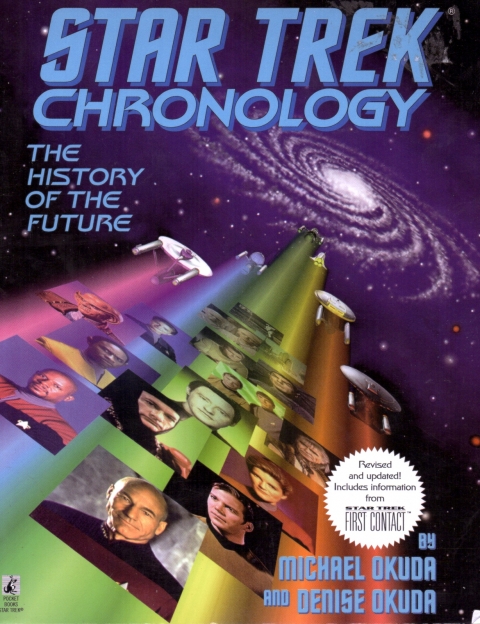Details
| Title : |
Star Trek Chronology: The History of the Future |
 |
| Writers : |
Michael Okuda and Denise Okuda |
| Published : |
1993 |
| Publisher : |
Pocket Books |
| ISBN : |
0671536109 |
| Rating : |
 |
| Editions : |
There are two editions; the first is on plain paper and has black and white illustrations. The second is more up to date, printed on glossy paper with full colour illustrations. As with the encyclopedia, a third edition would surely be appropriate now that Enterprise has finished. |
Review
Next to the Encyclopedia this is probably one of the most useful of the Trek reference manuals. What the Okudas have done is go through every episode and movie and compile every single date ever mentioned, no matter how obscure. And not just specific dates - if a character so much as mentions that he hasn't done something in twenty years, track back twenty years before the episode and you'll find it listed there.
The wonderful thing about the Chronology is that it makes it clear just how
well the Trek universe hangs together. Fans love to nitpick - I enjoy it myself - but considering that there have been over seven hundred Trek episodes produced, the degree of internal consistency in the back history of the show is nothing short of staggering.
One slightly controversial note is that the book is built on a few core assumptions. For instance, no clear date was ever given for when the original series was set. What hints we did get ranged from the twenty second century up to many centuries later. The Chronology takes the stand that TOS happened exactly three centuries after the show was originally broadcast, which contradicts some of the episodes and movies. However, the chronology dates have since been confirmed in many episodes - it's clear that the writers are using it as a reference in producing the show and it's become clear that this is the "real" timeline, for better or worse. The book also assumes that all dates given are exactly as stated - if a character says something hasn't happened in a thousand years, the chronology assumes that this means it last happened
exactly a thousand years ago. While people are not generally so precise in their language, the Okudas could hardly have done anything else but take statements at face value - simply substituting their own random dates would hardly be satisfactory.
In the rear of the book we get condensed timelines for each of the main characters, with some discussion of what we know and don't know about them by the writers. There's also some discussion of major events such as wars, the advent of major inventions such as the transporter, etc.


